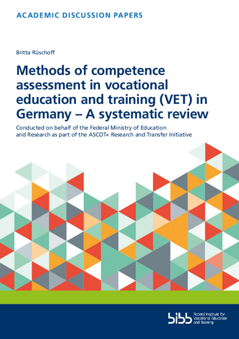Apr 13, 2023
Methods of competence assessment in vocational education and training (VET) in Germany – A systematic review
Summery
Conducted on behalf of the Federal Ministry of Education and Research as part of the ASCOT+ Research and Transfer Initiative
The aim of the present review is to provide a systematic overview of the methods of competence assessment currently available in German vocational education and training (VET). This
comprises a general inspection of available instruments, obtaining insights into the scientific
quality of these instruments, and subjecting them to critical consideration against the background of opportunities for implementation in practice.
After initially inspecting 2,298 publications published between 2001 and 2017, 58 publications were selected for incorporation into the study. These publications include journal articles, monographs, and papers in edited volumes. The results of this review show that the
available instruments particularly relate to the assessment of competencies in commercial occupations, industrial and technical occupations, and occupations in healthcare. In the case of
commercial occupations, instruments are mainly in place for the training of industrial clerks.
Instruments in the industrial and technical sector primarily refer to the assessment of competencies in vehicle mechatronics technicians. In the healthcare sector, instruments are predominantly at hand for trainee medical assistants, although it should be noted that the prevalence
of eligible publications in healthcare is comparatively low compared to the other two occupational fields. Most instruments reviewed in this study deal with the identification of professional competencies (66%). These are followed by publications addressing general competencies
such as mathematical skills and literacy (24%), and social and communicative competencies
(9%). Instruments relating to the assessment of social and communicative skills seem to be
particularly under-represented. In respect of the various types of instruments, a trend towards
IT-supported approaches can be identified. The results further demonstrate that validation of
the instruments is frequently ensured by an inspection of their content validity, which is in
some cases complemented by other validation procedures. However, assessments of predictive
validity appear to be largely absent. The reliabilities of the instruments are acceptable or good
for the most part.
In overall terms, this study demonstrates that there is already a solid basis of diagnostic
instruments for the assessment of competencies in vocational education and training. Yet, it
would be desirable to expand the development of instruments to encompass a broader spectrum of occupations and occupational fields. Moreover, additional validation and piloting of
the instruments need to take place so that they can be rendered usable for potential widespread transfer into practice.
-
Publication Month:
March
-
Publication Year:
2023

